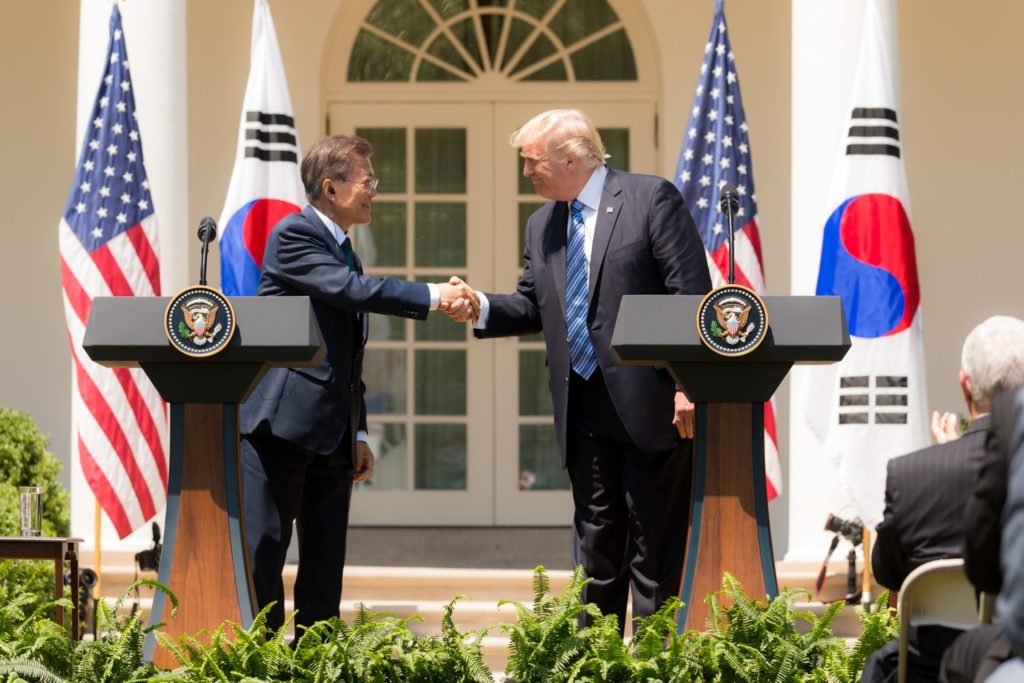The Peninsula
Agreement to Renegotiate KORUS FTA Removes Threat of Withdrawal for the Moment

By Troy Stangarone
Shortly after the first summit meeting between Presidents Donald Trump and Moon Jae-in, the United States notified South Korea that it would like to convene a meeting of the Joint Committee under the U.S.-Korea FTA, or KORUS FTA, to discuss amending the agreement. Amending the KORUS FTA has been an objective of President Trump since last year’s presidential campaign and after the most recent meeting of the Joint Committee the United States and South Korea have agreed to renegotiations.
This will be the second time that the United States has pushed to renegotiate the KORUS FTA, which was originally signed in 2007 but not implemented until 2012. Much as was the case after the agreement was originally concluded in 2007, the new talks will likely focus on addressing issues in automotive trade.
Since coming into force, the United States trade deficit with South Korea has grown from $13.2 billion to $27.7 billion, but is down 28.1 percent through August. Over the same period, the United States trade deficit in the automotive sector has grown 77 percent to $24 billion and accounts for nearly 90 percent of the overall U.S. trade deficit with South Korea according to USTR.
While the automotive sector will be one of the key issues in talks, other issues that could potentially be discussed include implementation issues or revisions related to legal services, agricultural tariffs, data localization, digital trade, rules of origin and investment protections. While not all issues will apply, the ongoing talks over NAFTA also provide a good guide to the administration’s potential goals. At the same time, we should also expect South Korea to develop a list of areas where it would like to see changes that would be favorable to it as well.
Before entering into formal talks to amend the FTA, South Korea will need to undergo domestic consultation procedures including conducting an economic feasibility study, public hearings, and making a report to the National Assembly. As long as any South Korean requests do not require changes to U.S. law, the United States will be able to conduct the negotiations without utilizing the procedures under Trade Promotion Authority and already has authority to make any tariff changes agreed to with South Korea.
Additionally, with the agreement to renegotiate the KORUS FTA, the United States threat to withdraw from the agreement should further recede into the background. At today’s Senate Finance Committee confirmation hearing, Jeffrey Gerrish, nominee for Deputy USTR for Asia, and Gregory Doud, nominee for Chief Agriculture Negotiator, both noted that the administration should do no harm to existing FTAs. But the threat could still resurface as in the NAFTA talks where President Trump mused after renegotiations began that he could still decide to withdraw from NAFTA. So, the prospect that the issue of withdrawing from KORUS could return at a future date.
However, the current security situation makes it imperative that the talks proceed smoothly and that the threat of withdraw is removed from the equation. As North Korea moves closer to completing its nuclear and missile programs, it will be increasingly important for the United States and South Korea to maintain close policy coordination and avoid issues that could create tensions in the alliance at a critical stage.
An improved KORUS FTA has the potential to benefit both the United States and South Korea. In the area of digital trade, well-known companies such as Facebook and Youtube were only just establishing themselves and updating the agreement to reflect modern trade patterns should be mutually beneficial. The key is to find ways to enhance the agreement rather and avoid disputes that create tensions in the alliance.
Troy Stangarone is the Senior Director for Congressional Affairs at the Korea Economic Institute of America. The views expressed here are the author’s alone.
Photo from Natig Sharifov’s photostream on flickr Creative Commons.
